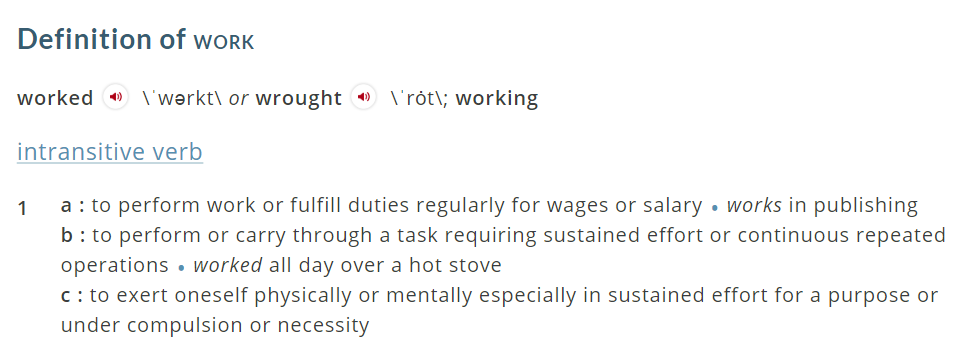“Find something you love to do and you’ll never have to work a day in your life.”
If we analyze this quote, it kind of makes work a bad thing. Something to be avoided or changed by doing what you really love because they appear to be incompatible.
Or, on the other hand, it idealizes the thing you love with the idea that there is no work behind it, which is also not true.
Because actually, work is work, even if it is the thing you love.
But what does the act of work mean? If we look at the definition of the Merriam-Webster dictionary it describes work as:
Merriam-Webster dictionary.
It seems that the connotation we assign to work is quite negative. This unconsciously creates negative feelings and reactions to the idea of doing it, so no wonder there is a social resistance to it. Who would want to work under these conditions?
To change perspective I want to share two concepts of work that I really liked:
“In order to practice the application of joyful effort succesfully, one must have the ability to concentrate, to focus on events, actions, or goals.”
The Dalai Lama's Little Book of Wisdom mentions the idea that we must live our life with joyful effort, in relationship to Buddhist literature and the practice of the Six Perfections [1]
I really like that concept, because this idea in a sense acknowledges that there is indeed effort behind, that there are ups and downs, that you have to do things, but that you approach them with a positive state of mind, instead of a sense of obligation.
This one is from the book Neo-Prehistory: 100 Verbs where curators Andrea Branzi and Kenya Hara selected one hundred verbs, connected to one hundred objects, to let us travel across human history. A wonderful read.
I love that it speaks about contribution, proactivity and being capable (contrary to the frequent impostor syndrome; you are already doing said activity anyway).
In the end, concepts are what shape the way we feel and behave. Therefore, it would be probably helpful to shift from the negative connotation we have of the concept of work to a more positive notion of that thing we do every day, so we can find more delight in the practice.
GIF by Julia Veldman.
References
(1) His Holiness Dalai Lama. (2010) The Dalai Lama's Little Book of Wisdom. Hampton Roads Publishing.
(2) Branzi, A., Hara, K. (2016) Neo-Prehistory: 100 Verbs. Lars Müller Publishers.





